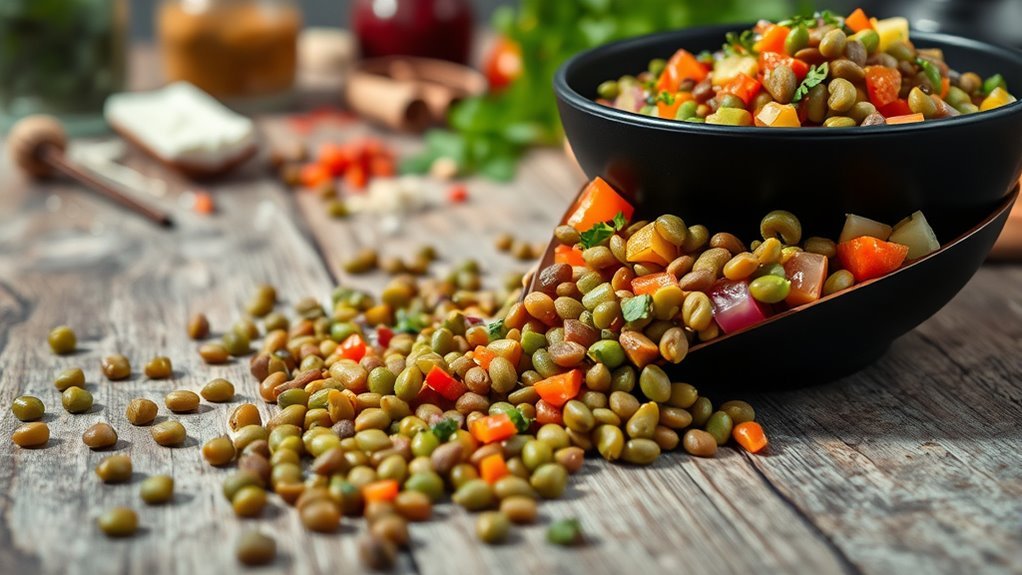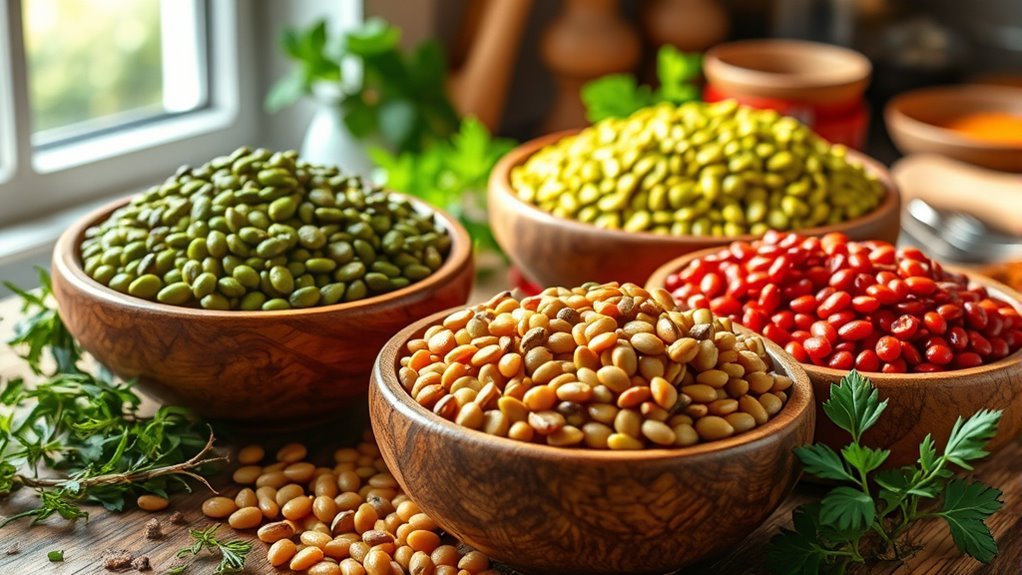Lentils aren’t generally considered keto-friendly due to their higher carbohydrate content. A cup of cooked lentils contains about 20 grams of carbs, which may not fit into your daily limit on a ketogenic diet. However, you can enjoy them in moderation while pairing them with low-carb vegetables. This way, you can still reap their health benefits. If you’re curious about how to incorporate lentils into a low-carb diet, there are more insights available.
Understanding the Ketogenic Diet

When considering the ketogenic diet, it’s vital to understand its fundamental principles. At its core, the ketogenic diet emphasizes low carb guidelines, typically limiting carbohydrate intake to about 20-50 grams per day. This restriction encourages your body to enter a state of ketosis, where it burns fat for energy instead of carbohydrates. Adhering to ketogenic principles means prioritizing healthy fats, moderate protein, and minimal carbs. Foods like avocados, nuts, and certain meats are staples, while grains and sugars are largely avoided. This approach can lead to weight loss and improved energy levels, but it’s essential to guarantee nutritional balance. Aiming for 20 to 50 grams of carbohydrates daily is crucial for maintaining ketosis. Understanding these principles empowers you to make informed choices and embrace the freedom that the ketogenic lifestyle offers.
Nutritional Profile of Lentils

When considering lentils in your diet, it’s important to look at their macronutrient breakdown and fiber content. Lentils are primarily composed of carbohydrates, along with protein and a modest amount of fat, which can impact your ketogenic goals. Additionally, their high fiber content can offer digestive benefits, but it may also affect your overall carb intake.
Macronutrient Breakdown
Although lentils are often praised for their health benefits, understanding their macronutrient profile is vital for anyone considering a ketogenic diet. Lentils are rich in nutrients, but their macro ratios may not align with keto principles. Here’s a quick breakdown:
- Carbohydrates: Lentils contain about 20 grams of carbs per cooked cup, which can impact your daily carb allowance on keto.
- Protein: They provide roughly 18 grams of protein, making them a decent source for muscle support.
- Fat: With only about 0.5 grams of fat, lentils lack the healthy fats that are important for a ketogenic lifestyle.
While lentils boast impressive nutrient density, their carb content can hinder your keto goals. Balancing your macros is key!
Fiber Content Analysis
While many might focus on the carbohydrate content of lentils, their fiber content is equally significant and deserves attention. Lentils are packed with dietary fiber, making them one of the best fiber sources available. A single cup of cooked lentils contains around 15.6 grams of fiber, which can greatly benefit your digestive health. Including lentils in your diet can help regulate bowel movements, prevent constipation, and support overall gut health. Plus, the high fiber content can aid in weight management by promoting a feeling of fullness. If you’re seeking a nutritious way to enhance your meals while still enjoying the freedom of varied flavors, lentils can be an excellent choice for incorporating fiber into your diet.
Carbohydrate Content in Lentils

When considering lentils in your diet, it’s important to look at their carbohydrate content. While they do contain carbs, understanding net carbs can help you determine how they fit into a keto lifestyle. Additionally, comparing lentils with other legumes can provide context for their role in your overall carbohydrate intake.
Lentils’ Carb Count
Lentils are a popular source of plant-based protein, but their carbohydrate content can be a concern for those following a ketogenic diet. Understanding lentils’ nutrition is essential when considering carb alternatives. Here are three key points about their carb count:
- Carbohydrate Content: One cup of cooked lentils contains about 40 grams of carbs.
- Fiber: Lentils also provide around 16 grams of fiber, which can help mitigate some carb impact.
- Protein: They pack about 18 grams of protein per cup, making them a nutrient-dense choice.
While lentils offer numerous health benefits, you may want to monitor your intake if you’re strict about carbs. Exploring other low-carb options can help you maintain your ketogenic lifestyle while still enjoying delicious meals.
Net Carbs Explained
Understanding the concept of net carbs is essential for anyone maneuvering a ketogenic diet, especially when it comes to foods like lentils. Net carbs are calculated by subtracting fiber from total carbohydrates, as fiber isn’t digestible and doesn’t raise blood sugar levels. Lentils, while nutritious, are relatively high in carbohydrates compared to other keto-friendly foods. They contain about 20 grams of total carbs per cooked cup, which includes roughly 8 grams of fiber, resulting in about 12 net carbs. For those making keto adaptations, moderation is key. You might still enjoy lentils occasionally, but you’ll need to be mindful of your overall carb intake to stay within your desired limits on a ketogenic diet. Additionally, understanding the carbohydrate content of different legumes can help you make better choices for your diet.
Comparison With Other Legumes
While many people enjoy legumes for their nutritional benefits, not all are created equal regarding carbohydrate content. In a legume comparison, lentils stand out among various options. Here’s a quick look at some common legumes and their carbohydrate profiles:
- Lentils (varies by type): Generally, about 20 grams of carbs per cooked cup, but you can find lower-carb lentil varieties, like black lentils.
- Chickpeas: Roughly 45 grams of carbs per cooked cup, making them higher in carbs compared to most lentils.
- Kidney Beans: Approximately 40 grams of carbs per cooked cup, which also tips the scale in favor of lentils for lower carb intake. Additionally, understanding the carb content of foods is essential for making informed choices on a ketogenic diet.
Comparing Lentils to Other Legumes
When comparing lentils to other legumes, it is essential to recognize their unique nutritional profile. Lentils, available in various lentil varieties like green, red, and black, offer distinct benefits. They generally contain fewer carbohydrates than beans and peas, making them a better option for those following a keto lifestyle. Additionally, lentils pack a punch with their high protein and fiber content, contributing to satiety and digestive health. While all legumes provide essential nutrients, lentils stand out for their quick cooking time and versatility in dishes. By incorporating lentils into your diet, you can enjoy the legume benefits without compromising your dietary goals, offering you freedom in your meal planning.
Health Benefits of Lentils
Lentils aren’t just a versatile ingredient; they also offer numerous health benefits that make them a valuable addition to your diet. Packed with nutrient density, these legumes support your well-being in various ways:
- Heart Health: Lentils are rich in fiber and potassium, which can help lower cholesterol levels and maintain healthy blood pressure.
- Weight Management: Their high protein and fiber content can keep you feeling full longer, aiding in weight control.
- Blood Sugar Control: Lentils have a low glycemic index, making them a smart choice for stabilizing blood sugar levels.
Incorporating lentils into your meals can enhance your overall health, offering essential nutrients while satisfying your cravings for freedom in food choices.
Incorporating Lentils Into a Low-Carb Diet
If you’re considering a low-carb diet, you might wonder how to fit lentils into your meal plan. While lentils are nutritious, they’re higher in carbs than many keto-friendly foods. To enjoy lentils without exceeding your carb limit, try using them in moderation. Look for lentil recipes that incorporate small portions, like lentil soups or salads, where you can balance them with low-carb vegetables. Alternatively, consider keto substitutions such as cauliflower rice or zucchini noodles to replace lentils in traditional dishes. This way, you can still savor the flavors while maintaining your low-carb goals. Remember, it’s all about balance and finding creative ways to incorporate your favorite foods without compromising your dietary choices.
Alternatives to Lentils for Keto Dieters
For those following a keto diet, finding suitable alternatives to lentils can be key to maintaining your carb limits while still enjoying hearty meals. Thankfully, there are several options that provide similar textures and flavors without the carbs. Here are three keto-friendly choices:
- Cauliflower Rice – A versatile base for stir-fries or grain bowls, it’s low in carbs and rich in nutrients.
- Shirataki Noodles – Made from konjac root, these noodles are low in calories and carbs, perfect for those craving pasta.
- Zucchini Noodles – Spiralized zucchini offers a satisfying replacement for traditional grains, packed with vitamins and fiber.
Incorporating these keto-friendly vegetables and low carb grains into your meals can enhance your diet while keeping it enjoyable. Additionally, opting for these alternatives helps to reduce carb intake, which is essential for maintaining a state of ketosis.
Final Thoughts on Lentils and Keto Compatibility
When considering the overall compatibility of lentils with a keto diet, it’s important to weigh their nutritional profile against your carbohydrate goals. Lentils provide valuable nutrients, but their carbohydrate content may exceed what you’re aiming for on keto. If you’re looking to stay within those limits, you might explore lentil alternatives like cauliflower rice, shirataki noodles, or zucchini, which can help you maintain lower carb intake while still enjoying satisfying meals. These keto substitutes can offer similar textures and flavors without compromising your dietary objectives. Ultimately, it’s about finding the right balance that aligns with your lifestyle. If you love lentils, consider portion control or pairing them with low-carb ingredients to enjoy them in moderation.
Frequently Asked Questions
Can I Eat Lentils During Intermittent Fasting?
You can eat lentils during intermittent fasting, but it’s best to do so during your eating window. Lentils offer numerous benefits, like being high in protein and fiber, which can help keep you full longer. However, consuming them outside your eating hours could break your fast. Enjoying lentils when you do eat can support your overall health while still allowing you the freedom to manage your fasting schedule effectively.
What Are Some Keto-Friendly Lentil Recipes?
You might think lentils aren’t keto-friendly, but there are creative ways to enjoy them! Try a keto lentil salad with avocado, spinach, and a tangy lemon dressing to keep it low-carb. Or whip up a spicy lentil stew using cauliflower and zucchini to replace traditional carbs. Both recipes pack flavor without compromising your keto goals. Just be mindful of portion sizes to stay within your macros while enjoying these dishes!
Are Canned Lentils Suitable for a Keto Diet?
Canned lentils can be suitable for a keto diet, but you’ll need to be mindful of their nutritional value and carb content. While they’re a great source of protein and fiber, they also contain carbohydrates that can impact ketosis. Typically, a half-cup serving has around 20 grams of carbs. If you’re aiming for a strict keto approach, you might want to limit your intake or balance it with lower-carb foods.
How to Prepare Lentils for a Low-Carb Meal?
You might think lentils aren’t suitable for a low-carb meal, but they can be prepared creatively! Start by rinsing and cooking them in vegetable broth for added flavor. Pair them with low-carb alternatives like zucchini noodles or cauliflower rice. If you’re looking for lentil substitutes, consider mushrooms or chickpeas, which can provide similar textures. Season with herbs and spices to enhance taste, keeping your meal both satisfying and nutritious while enjoying your food freedom!
Do Lentils Affect Ketosis Levels?
Lentils can impact ketosis levels due to their carbohydrate content. With around 20 grams of carbohydrates per cooked cup, they can potentially disrupt your state of ketosis if consumed in large amounts. However, if you’re mindful of portion sizes and balance them with low-carb foods, you can still enjoy lentils in moderation. It’s all about finding that sweet spot to maintain your freedom while keeping your ketosis goals in check.
Are lentils keto-friendly?
Lentils are generally not considered keto-friendly due to their relatively high carbohydrate content. A standard serving of cooked lentils (about 1 cup) contains approximately 40 grams of carbohydrates, which can exceed the daily carb limit for many people following a ketogenic diet. However, they are a good source of protein and fiber, making them a nutritious option for those who are not strictly adhering to a keto diet.
What is the carbohydrate content in lentils?
Lentils are rich in carbohydrates, with approximately 40 grams of carbs per cooked cup. They also provide around 18 grams of protein and 16 grams of fiber, which can help mitigate blood sugar spikes. For those on a keto diet, this high carb content may make it difficult to stay within the typical daily limit of 20-50 grams of carbs.
Can I include lentils in a low-carb diet?
Yes, you can include lentils in a low-carb diet, but moderation is key. If you’re following a low-carb plan that allows for some carbohydrate intake, small portions of lentils can be incorporated. Consider using lentils as a side dish or mixed with non-starchy vegetables to balance the overall carb content of your meal.
What are some low-carb alternatives to lentils?
If you are looking for low-carb alternatives to lentils, consider options like cauliflower rice, zucchini noodles, or shirataki noodles. These alternatives are low in carbohydrates and can provide similar textures in various dishes. Additionally, beans like black soybeans are lower in carbs compared to traditional lentils and can be a suitable substitute for some recipes.
Can I eat lentils during intermittent fasting?
Yes, you can eat lentils during your eating window when following intermittent fasting. Lentils provide a good balance of protein and fiber, which can help keep you full and satisfied. However, if you are aiming for weight loss and following a strict low-carb or keto regimen, you may want to limit their intake to avoid exceeding your carbohydrate limits.
References
- https://www.health.harvard.edu/staying-healthy/the-ketogenic-diet
- https://www.ncbi.nlm.nih.gov/pmc/articles/PMC2693158/
- https://www.webmd.com/diet/obesity/ss/slideshow-ketogenic-diet-guide
- https://www.mayoclinic.org/healthy-lifestyle/nutrition-and-healthy-eating/expert-answers/keto-diet/faq-20464977
- https://www.ncbi.nlm.nih.gov/pmc/articles/PMC7381875/
- https://www.ncbi.nlm.nih.gov/books/NBK499877/
- https://www.eatright.org/health/wellness/healthy-aging/the-keto-diet-and-older-adults
- https://www.usda.gov/food-nutrition
- https://www.washingtonpost.com/food/2020/01/09/keto-101/


